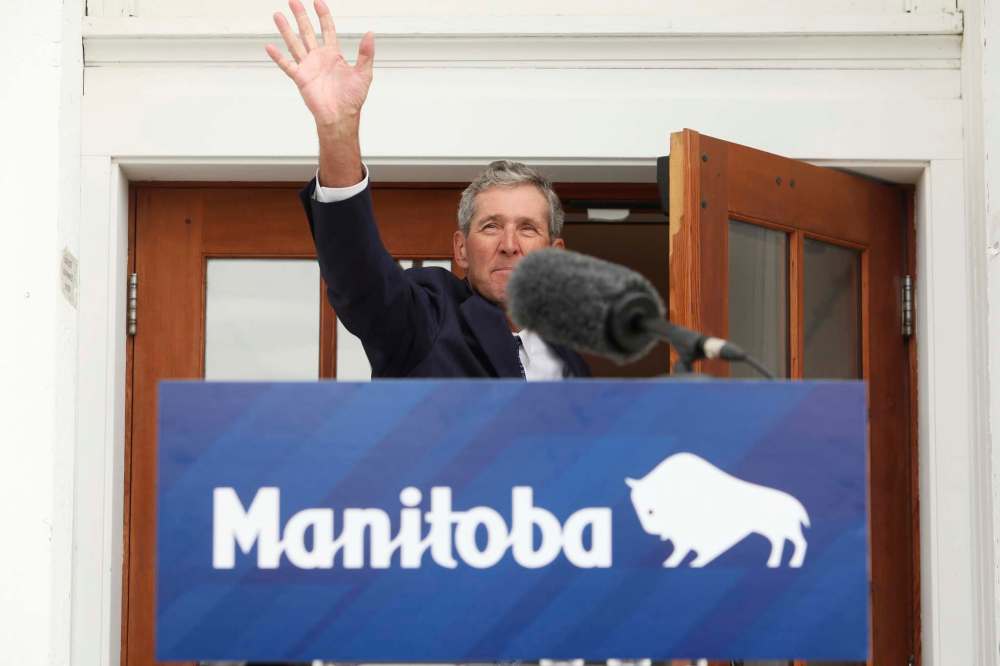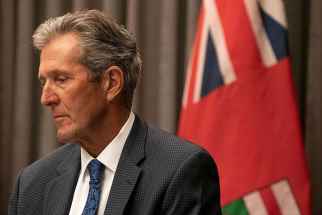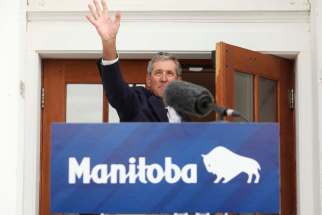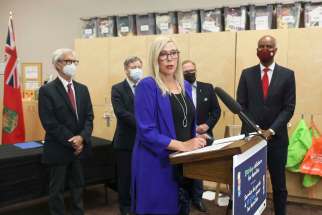Only option for next Tory premier: be the anti-Pallister
Read this article for free:
or
Already have an account? Log in here »
To continue reading, please subscribe:
Monthly Digital Subscription
$0 for the first 4 weeks*
- Enjoy unlimited reading on winnipegfreepress.com
- Read the E-Edition, our digital replica newspaper
- Access News Break, our award-winning app
- Play interactive puzzles
*No charge for 4 weeks then price increases to the regular rate of $19.00 plus GST every four weeks. Offer available to new and qualified returning subscribers only. Cancel any time.
Monthly Digital Subscription
$4.75/week*
- Enjoy unlimited reading on winnipegfreepress.com
- Read the E-Edition, our digital replica newspaper
- Access News Break, our award-winning app
- Play interactive puzzles
*Billed as $19 plus GST every four weeks. Cancel any time.
To continue reading, please subscribe:
Add Free Press access to your Brandon Sun subscription for only an additional
$1 for the first 4 weeks*
*Your next subscription payment will increase by $1.00 and you will be charged $16.99 plus GST for four weeks. After four weeks, your payment will increase to $23.99 plus GST every four weeks.
Read unlimited articles for free today:
or
Already have an account? Log in here »
Hey there, time traveller!
This article was published 11/08/2021 (1581 days ago), so information in it may no longer be current.
Like an aging house with good bones that has fallen into disrepair, Manitoba’s Progressive Conservative Party is going to need a total gutting if it expects to contend in the October 2023 provincial election.
Premier Brian Pallister surprised political watchers Tuesday by announcing he would step down sometime in the near future. The PC party is currently deliberating on how and when to pick a new leader.
However, while nobody knows exactly when all that will happen, we do know the Tory party is weighed down by five years of bad decisions and nearly constant conflict.
Where does a new premier start rebuilding the party brand? Most Tories will tell you to start with Bill 64, the Education Modernization Act.
Bill 64 eliminates democratically elected school divisions, bringing all 36 English-language boards under a single provincial education authority. The new authority was to be created this fall, and come into effect by July 1, 2022.

Critics outside the PC party have characterized Bill 64 as a mean-spirited exercise in cost-cutting that will have no positive impact on the quality of education. Tory MLAs, even those in solidly Tory rural ridings, are quietly acknowledging Bill 64 is a millstone that will drag them down in the next election.
Many Manitobans see their school divisions as a guard against a province-wide, cookie-cutter approach to education that ignores local sensibilities. Quite a few Tory MLAs are talking openly in caucus about how Bill 64 could be the straw that breaks their chances at re-election, even in some seats considered to be safe in previous elections.
For those reasons, it is hard to imagine the next premier will not find an excuse to put Bill 64 on ice. But even that grand gesture, on its own, will not be enough to save the Tories from themselves come 2023.
The next premier must also find a way to fix a badly executed hospital reorganization initiative and move aggressively to reduce priority surgery wait times.
Whatever common sense existed in 2016 when Pallister unveiled his ambitious plan to reorganize and rationalize Winnipeg hospitals — which led to three of six city emergency rooms being closed —it was undermined through a combination of mismanagement and austerity.
Quite a few Tory MLAs are talking openly in caucus about how Bill 64 could be the straw that breaks their chances at re-election, even in some seats considered to be safe in previous elections.
Pallister promised the reorganization would improve health care, but his decision to essentially freeze health-care funding and cut support to the Winnipeg Regional Health Authority at the same time doomed his own initiative to failure.
To make matters worse, Pallister steamrolled ahead with the reorganization without enlisting support from health professionals. Nurses, in particular, used what limited control they still had over their working lives to resist transfers necessary to make the hospital plan work. Chaos ensued.
It was also maddening that as Pallister cut taxes, he allowed surgical wait times for hips, knees and cataracts to grow exponentially by freezing funding.
Now, with thousands of surgeries delayed because of the pandemic, the next premier will have to find the resources to eat into those gargantuan wait lists, while devising a strategy to stabilize the shattered hospital system largely by rebuilding trust with nurses.
And that brings us to fiscal policy. The next premier may have to consider pausing or cancelling Pallister’s tax cuts, particularly the second 25 per cent reduction in education property taxes slated for next year and a lingering pledge to cut the PST by another point.
The next premier may have to consider pausing or cancelling Pallister’s tax cuts, particularly the second 25 per cent reduction in education property taxes slated for next year and a lingering pledge to cut the PST by another point.
Pallister’s original grand fiscal plan involved balancing the budget quicker than originally promised, then reducing taxes as a way of shrinking government’s overall footprint. The pandemic blew a huge hole in that strategy but remarkably, it did not dampen Pallister’s appetite for tax cuts.
In the budget where he forecast the biggest single-year deficit in Manitoba history, he also unleashed a multi-year-plan to eliminate the education portion of property taxes, starting with a 25 per cent cut in each of the next two years. In essence, he was borrowing money to cut taxes.
Demonstrating his now-legendary lack of self-awareness, Pallister seemed genuinely shocked that Manitobans didn’t write folk songs about his decision to cut taxes in the midst of a crippling economic crisis. Manitobans quickly deducted the hubris in this decision. The next Tory premier must find a way to walk back additional tax cuts until finances improve.
There are lots of other things a new premier could do to improve the Tories’ chances in 2023: stop appealing the unconstitutional wage-freeze bill struck down by the Court of Queen’s Bench; negotiate new and favourable settlements with public sector bargaining groups that have gone without a contract for several years; meet in person with people outside government to find out what they really think; stop abusing statistics to defend your government’s woeful record.
It is hardly impossible for the Tories to win a third election. NDP Leader Wab Kinew has taken his party to first place in opinion polls, but only because of the surging dislike that Manitobans have for Pallister. With Pallister gone, Kinew will have to retain that support without a foil.
With two years before the next election, the new premier has an opportunity to snatch victory from the jaws of defeat. But only if they have the courage to assume the only role that voters will care about: the anti-Pallister.
dan.lett@freepress.mb.ca

Born and raised in and around Toronto, Dan Lett came to Winnipeg in 1986, less than a year out of journalism school with a lifelong dream to be a newspaper reporter.
Our newsroom depends on a growing audience of readers to power our journalism. If you are not a paid reader, please consider becoming a subscriber.
Our newsroom depends on its audience of readers to power our journalism. Thank you for your support.









